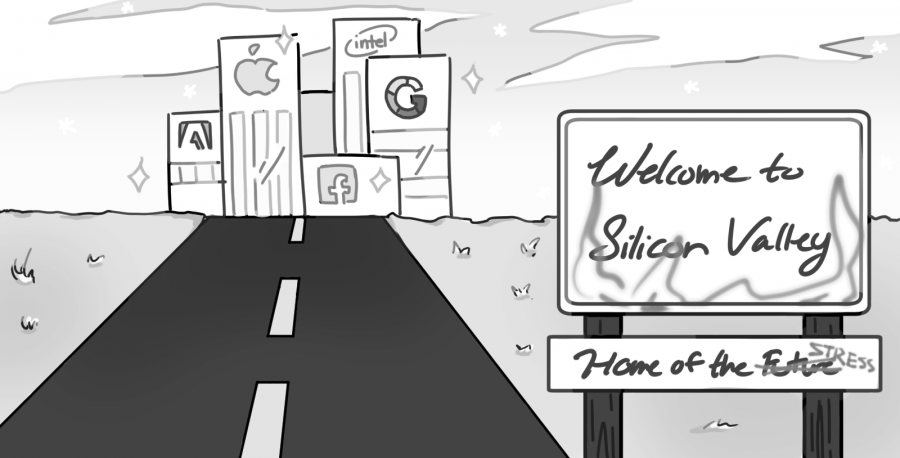Silicon Valley is Stressed, Depressed and Striving for the Best
At 2:35 p.m. every day, I make the drive from Los Altos to Palo Alto to attend my internship at a political non-profit organization. It typically takes 10 to 15 minutes to get there, 30 if there’s traffic. As I drive into Town & Country, directly across from Stanford, I see Palo Alto High School students getting out of school, leaving campus in Range Rovers and BMWs. I walk into my internship, sit down, open my computer and begin working.
Typically reserved for college students, internships among high schoolers have become a norm within Silicon Valley. Competition for a coveted spot at a Stanford lab or for a notable tech startup is fierce, but opportunities, relative to other parts of the United States, are plentiful.
More than just a location, Silicon Valley is also a culture with a specific mindset. A meritocracy, Silicon Valley provides opportunities for those who are able to fuse innovative ideas with hard work and dedication. Yet in this fast-paced environment of cutting edge production and competition, it is all too easy to feel the stress and pressure that comes from such a debilitating condition.
Living in the Silicon Valley provides us with a great level of opportunity — we routinely interact with global markets and companies like Google, Apple, Facebook and Tesla. We have significantly more access to technology than much of the nation, and we attend schools that consistently rank as some of the best in the country. However, this high degree of opportunity brings about a pressure to achieve and succeed, and opportunities, which by nature are positive, become increasingly viewed as obstacles.
The inherent need to seize and excel in the opportunities we encounter is derived from a combination of our environment, familial expectations and the standards we put on ourselves. As we compete for the “best” opportunities in an attempt to rise above our peers and gain a competitive edge in college applications, we become more focused on the competition revolving around these opportunities and less focused on their potential to be constructive and beneficial. Internships, jobs and volunteer opportunities, all meant to help us find our passions or our niches, become viewed as another notch on our resume, a few words that will help us look more favorable in the eyes of college admission officers.
The result of the competition surrounding opportunities and the pressure to fully take advantage of them aids the development of neurotic perfectionism within ourselves. Neurotic perfectionism is when someone is constantly striving for extreme, nearly unrealistic levels of achievement, and rarely, if ever, feels satisfied with their own accomplishments.
The national average on the old SAT is 1500; the halls of Los Altos are filled with students who routinely complain about their 2100. Going to college is a privilege for many around the world, yet in the Valley, getting into a UC is often an expectation. Many students in this area simply do not seek to be average or even above average. They want to be the best.
We must remind ourselves that although in the present moment, our lives may seem dependent upon getting into a good college, college is not the determining factor to leading an accomplished life. There is a difference between working hard to attend a good college versus working hard to have a successful future. The skills you acquire from the opportunities you have seized will serve you far better in your life than just attending an Ivy League.
There’s a much bigger picture that we often forget in light of current pressures and stressors. Many of us will eventually leave the Silicon Valley at some point in time, and our migration away from this “bubble” will bring us a much broader perspective on life. As teenagers, college may be a priority, one that we might sometimes sacrifice our well-being for, but the variety of opportunities and quality of education that the Silicon Valley provides us with will allow us to become more successful in life in the long run.
Ultimately, it is not important that we seize all the opportunities available to us; it is important that we make the best out of the ones we do choose to pursue and treat each opportunity like a learning experience, and not like another line to put on our resume. In the end, success will not be attending Harvard or getting a job at a Fortune 500 company, but rather finding topics we are passionate about and taking the time to explore these passions.





